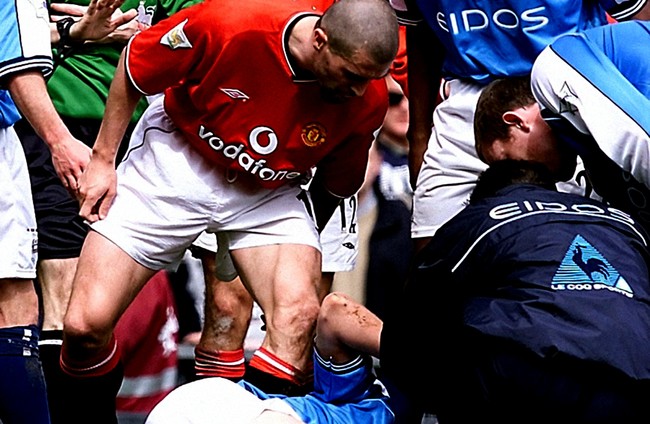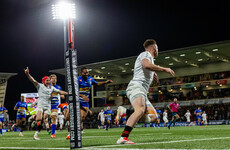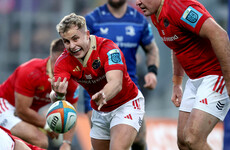WHEN THE POLICE came through the doors that is when the players in the away dressing room at Old Trafford knew things were serious.
This would be no ordinary fallout to a Manchester derby.
It was April 2001 and City, mired in a relegation dog fight, had snatched a late draw at the home of United, the champions-elect, courtesy of Steve Howey’s 84th minute goal.
It had cancelled out Teddy Sheringham’s effort with a little over quarter of an hour remaining.
But nobody was talking about that.
The result was of little consequence, not just because United would still romp home to their third successive Premier League title or that City would be unable to avoid the drop, but because of what happened between Roy Keane and Alfe-Inge Haaland near the far touchline at what is now called the Sir Alex Ferguson Stand.
It’s on the opposite side to the dugouts at Old Trafford and that is where City’s substitute goalkeeper Nicky Weaver, who had been dislodged as No.1 earlier in the campaign, watched from the bench.
“We knew that there was a good bit of needle between Keane and Alfie from when Alfie was at Leeds,” Weaver, now Sheffield Wednesday’s goalkeeping coach, recalls.
“I was quite away from it and didn’t know how bad it really was until we were in the dressing toom afterwards and watched it back on the video.
“It was like ‘wow, that is a horror tackle, absolutely shocking’. Some of the lads who were closer to it at the time could see straight away, they realised but the rest of us didn’t. It was shocking when we saw it.”
That was the prevailing sense around Old Trafford and United seemed to realise the gravity of the situation quickly. As Haaland received treatment from City’s medical staff, things took a turn when the doors flung open.
Police came into the dressing room, I’m sure they wanted Alfie to sign something so he wouldn’t press charges against Keane. There was some sort of legal person there as well, some sort of director from United, I think.
“They wanted him to sign it but Alfie wouldn’t sign it and it was just as well because it all came out in Keane’s book that he did it on purpose.”
That reignited the situation the following year, with Keane brought before an English FA displinary hearing in which he was banned for five games and fined £150,000. The revelations that the tackle was premeditated also led to City announcing that they would seek damages from the United captain for up to £5 million.
Haaland, too, considered a lawsuit when he was forced to retire from the game prematurely due to a problem with his other knee.
City and Haaland later dropped their plans to sue and yet, 19 years on and with a Manchester derby taking place in much different circumstances later today, the whole episode remains an integral part of the fixture’s history.
Weaver played his own part during his 10 years at the club, although the period 1997-2007 was when City flittered between the old First Division and the Premier League before eventually establishing themselves as a middling top flight club.
That has all changed in the decade since, however, with City overtaking United following the takeover by Sheikh Mansour and his Abu Dhabi United Group.
Weaver reels off some of the names that were long left behind in the name of progress.
Richard Dunne… Dunney, what a humble guy, he got better every single year and is one of the best lads. He didn’t speak much but when he did you would listen, and there weren’t many who could keep up with him on a night out,” Weaver laughs.
“Mark Kennedy was another one, a wand of left foot and all the talent in the world. We had some crazy nights out but he showed his class on the pitch.”
Willo Flood was another who broke into the City first team during the mid to late 2000s under Kevin Keegan, while Glenn Whelan and Paddy McCarthy didn’t quite manage to force their way in.
“All great lads, though, with the right attitude and they went on to have careers in the game, really, really good careers so there is nothing but respect there for them.”
And that brings us to Stephen Ireland.
Weaver sighs.
“What a player, he had everything. He was probably the most gifted and talented young player I saw during my time at City. Shaun Wright Phillips was the big young star and he was English so he was seen as the superstar in the making.
But Stephen had it all. Left foot, right foot, he would drift by people effortlessly, the way he would twist and turn, he was playing regularly in centre midfield in the Premier League at 18, 19 years of age so that just shows how good he was.
“He still went on and did good things at City, he played in some good teams but when they started really competing at the very top level and winning things, Stephen wasn’t there.
“He went to Aston Villa, to Newcastle, he still had a really good career but he was moving around and couldn’t settle.
“With the talent he had, in my opinion, he perhaps should have done a little bit better because the biggest young talent of all at City was Stephen Ireland, I thought he was going to go right to the top of the game.”
Injuries, a lack of form and changes in management all played their part in Ireland’s downfall and, as he revealed recently, there was plenty of personal issues off the pitch that he was dealing with, having become a father to two young children before he was out of his teens.
His international career, of course, was over almost as soon as it began because of the ‘Grannygate’ debacle, and Ireland’s club form dipped pretty quickly, too.
“Sometimes those outside influences, the injuries and what have you, issues away from the field, they catch up. Stephen was the one I thought could have got a move to one of the big, big clubs.
“He just lost his way. You need a lot more than talent sometimes and it never quite happened for Stephen.”














Remember when this happened and John Giles criticized Keane; Dunphy was no.1 Cheerleader at the time and made some serious but spurious allegations about Giles. Amazing how people get so wound up about things that don’t concern them
It was disgusting from Keane. A great player with a horrible attitude to the game. It was in retaliation to what? He injured himself trying to do Hangarland the first time round. It was Karma. Fair enough H gave a bit of verbal when K was on the ground but didn’t know how serious the injury was.
The most disgusting act of violence and cowardice I’ve ever seen on a football pitch. Keane should have been locked up for it. The guy’s a thug.
How did Stephen Ireland have a good career??? Yes he should have had with he’s ability but turned into something you would find with a pub team, he should have been playing in tournaments with ireland but wasted he’s talent, complete joke of a career without a club since 2018.he got move to Newcastle alright only made 2 appearances weaver doesn’t mention that, nor he has been that bad even Bolton didn’t want him.
@Paully Kells: he as being kind
@eddie horgan: was being kind